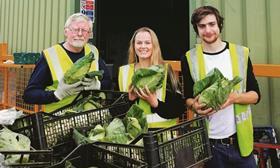
Fresh produce redistribution business Waste Knot has increased supply of surplus fruit and vegetables to charities amid the Covid-19 pandemic and believes there will be a permanent shift in how UK-grown produce is valued after the crisis.
The Covid-19 crisis has seen unprecedented demand placed on food redistribution charities from vulnerable and low-income households, with the likes of FareShare, The Felix Project and City Harvest all reporting a significant rise in their activities.
Alongside this, there has been a marked increase in volumes of surplus fruit and vegetables due to the closure of all restaurants, pubs and other hospitality venues. These factors have created a stronger motivation for growers and suppliers to support various charities, according to Waste Knot founder Jess Latchford.
She believes there are several changes afoot once we emerge from the current crisis. “We will see changes in attitude to eating more of what we can grow in the UK, eating seasonably, supporting home-grown business and appreciating the people who grow and produce our food as well as the importance of nature and each other,” Latchford said.
“When adversity hits like it has done over the last few weeks, there is no end of determination and no limit to what can be achieved when the right mode of thinking is employed. It is clear that this time has highlighted the need for us to examine, explore and react to our current ways of working such as our reliance on the global market.
“This period is giving us the luxury of time to look in from the outside and to make judgments on how we can live better, more wholly, more gratefully and in harmony with the environment.”
Acting as a go-between, Waste Knot connects growers like Worcestershire’s FerryFast with FareShare. This helps generate a cost-neutral source of income, guarantee work for farm staff, facilitate the supply of fresh produce to people who need it and prevent perfectly good food from going to waste.
Waste Knot was founded in 2016 to create a market for farmers to supply misshapen and surplus vegetables to hospitality, catering and charities. It already had systems in place to provide charities with food and vegetables though Fare Share’s Surplus for Purpose fund.
This is part of a £15 million Defra scheme to tackle food waste and allow redistribution charities to take surpluses from producers on a cost-neutral basis.
From January to March 2020, FerryFast and Waste Knot donated 131 tonnes offresh vegetables to 2,200 community organisations via FareShare, enough for an estimated312,000 meals for people in need. Since the Covid-19 began these volumes have increased significantly.
Peter Osborne, managing director of FerryFast, said: “Covid-19 has brought much grief and hardship, however positives will come from it too. Working with FareShare and Waste Knot provides a solution for otherwise unwanted produce and enables us to support a part of the community so often forgotten.
“If this period teaches us anything as a nation, I hope it teaches us that life is indeed precious and so is food. Let’s waste less and find a use for everything we source and produce.”



